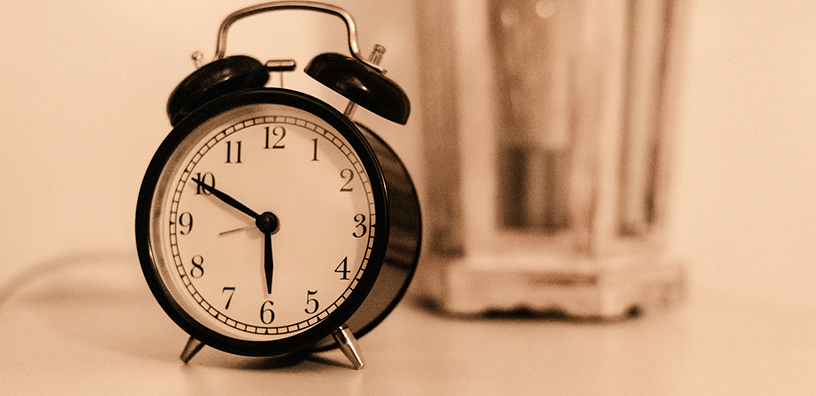
7 Tips for Waking Up Early
You’ve always wanted to have a productive morning routine. Getting up early, getting ready, taking a stroll with the dog, and sitting down to breakfast, the whole time feeling relaxed and not rushed. As wonderful as that sounds, many people struggle with just the first part of that dream: waking up early. However, there are a few tricks you can do to wake up early and maximize your morning.
Give yourself 7-8 hours of sleep

Getting the proper amount of sleep is vital to being able to wake up early, refreshed and free of grogginess that can weigh you down throughout the day. You might be thinking that’s easier said than done. You’d be surprised how simple it can be to wake up early if you plan around your sleep pattern. It’s all to do with the sleep cycle.
The sleep cycle is a process that your body goes through multiple times a night. It consists of 4 stages, leading into a final stage called Rapid Eye Movement (REM). We go into more detail regarding the sleep cycle in another article, but the important thing to know is that REM is the deepest stage of sleep and the hardest to wake up from. This makes sense considering it’s also the stage where dreaming occurs.*
If your alarm goes off during stages 3-5, fully waking up can be a nightmare. So, it’s important to plan your alarm for when you’re between cycles. Sleep cycles last on average roughly 90 minutes, so choosing the right time can make waking up easier.* There are countless sleep cycle calculators online that you can use to decide the right bedtime.
Plan ahead

The last thing you want to do is spend your morning sorting through your closet for an outfit, rushing around packing your bag, and potentially missing time for breakfast. Get ahead of the rush and prepare the night before. Lay out the clothes you want, steaming or ironing if needed. Pack the bag you are bringing and either prep your breakfast or decide what you’ll make. This leads to less decision and more time to slow down and enjoy the morning.
Visualize the morning you want

Visualization can be a powerful tool when it comes to waking up early. Your mind has a profound impact on the way you perceive and interact with the world around you. Before you go to bed, visualize how you want your morning to go. Do you want to wake refreshed? What about having time to take a short walk with the dog before you leave? Do you want a relaxed morning? Visualize it and watch your mind make it a reality.
Utilize an alarm

Though you can train your body to wake up at a specific time each day, this can take time consistent effort and practice to set in. Utilizing an alarm (or several) can be helpful, but must be used correctly to be effective. Our advice is to tailor your alarms to your specific needs. Let’s see an example:
If Martha knows that she needs to be up at 7 AM, she might set her alarm for 7. However, she’s observed that she tends to switch off her alarm and sleep for another 15 minutes before actually getting up. There’s nothing wrong with this, but she isn’t using her alarms to her advantage and ends up rushing to get ready each morning. Instead, she should set a 6:45 AM alarm. This way she tricks her brain into thinking she’s getting her usual 15 minutes of “extra” sleep, but she still gets up when she originally intended: 7 AM.
Take note of your waking habits and use them to your advantage.
Place electronics in another room

Electronics can be a huge hindrance to both falling asleep and waking up. When it comes to falling asleep, the blue light emitted from most, if not all electronics has been scientifically shown to inhibit the production of melatonin in the brain.* When melatonin is released, it makes you sleepy. Inhibiting this hormone makes feeling sleepy and falling asleep difficult.* Screens in the morning, while you may think they “help you wake up”, are usually no more than a distraction and reason to stay in bed longer. We suggest moving your phone out of reach of your bed or into another room.
Go right to the bathroom

The key to waking up and starting the day is getting your feet on the floor. The more you focus on how much you want to go back to sleep, the harder it will be to get moving. By putting that out of your mind, and pushing yourself up and out of bed, you’re less likely to focus on sleep and be more ready to conquer the day.
Drink a glass of water

How often do you go without drinking water? Believe it or not, while you’re sleeping, you aren’t drinking any water. Crazy, right? A great way to give your body a jumpstart is to drink a glass or two of water first thing in the morning. You are likely dehydrated and don’t even realize it. Give yourself the boost you need by placing a glass of water by your bed to drink when you wake up each morning.
Set your bed up for success

A healthy wake-up routine starts with healthy sleep. And healthy sleep starts with the right bedding. The sheets you choose have a huge impact on your ability to fall asleep, stay asleep, and wake up refreshed each morning. We recommend switching to bamboo viscose bed sheets. First, bamboo viscose sheets are more breathable than cotton. They allow airflow, keeping sleepers comfortably cool. Second, they wick away moisture. If you’ve ever woken up sweating under your sheets, the material might be the culprit. Bamboo viscose draws heat and moisture away from the body, allowing for a dry sleep. Lastly, bamboo viscose is hypoallergenic. This is a huge feature since most sheet materials attract common household non-living allergens and can be incredibly irritating to those with sensitive skin and noses. Bamboo viscose wards off these agitators and stays fresher for longer. Check out the Cosy House Luxury Bed Sheets for more information!
We've gone ahead & enclosed a 10% off coupon below for you to use if you'd like to take the plunge and try out our sheets for yourself! To shop our collection & get 10% OFF Use the code 'BLOG10' at checkout.
Resources:
WebMD. (n.d.). Stages of sleep: Rem and Non-REM Sleep cycles. WebMD. Retrieved from https://www.webmd.com/sleep-disorders/sleep-101.
Sleep basics: Rem & Nrem, sleep stages, Good Sleep Habits & more. Cleveland Clinic. (n.d.). Retrieved from https://my.clevelandclinic.org/health/articles/12148-sleep-basics.
Salamon, M. (n.d.). How to manage Blue Light for better sleep. WebMD. Retrieved from https://www.webmd.com/sleep-disorders/sleep-blue-light#:~:text=More%20so%20than%20any%20other,you%20longer%20to%20fall%20asleep.

